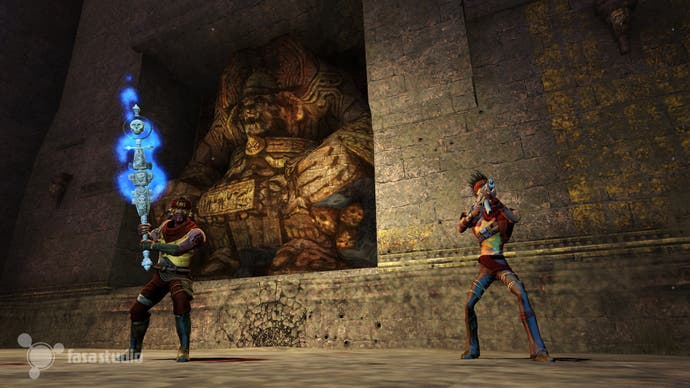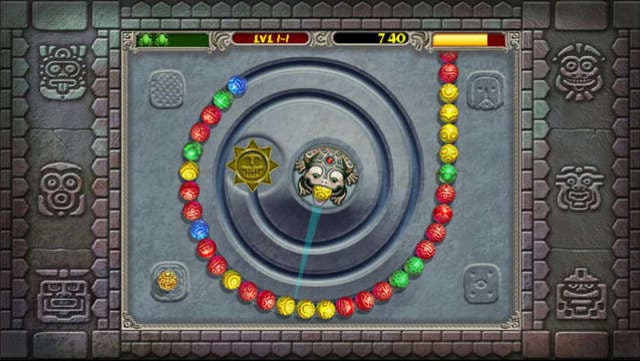Warren Spector on game development
Part 2: On 'less enjoyable paths' and reaching a wider audience.
Well, given that Junction Point isn't working on stuff designed to run on any of those platforms yet, I can't speak from direct experience. Having said that, it seems self-evident that you have to take into account what your controller is capable of any time you begin thinking about a game idea.
I've been stunned at how effective the touch screen on the DS is, and how effectively many games have used it. When I got my hands on a Wii, I was struck by how perfect it is for some things - and how terrible it is for some other things. If designers don't design games around that controller, I think they're are in for some trouble - players, too. But, clearly, there are lots of people putting a lot of brainpower behind exploiting the unique qualities of each system's controller and creating very cool, unique games as a result.

I could argue either side of this debate! On the one hand, the capabilities of a keyboard and mouse are pretty incredible. If you want instant response, fine control, all that stuff, you really want a keyboard and mouse. On the other hand, there's something almost soothing about picking up a controller - I mean, without ever cracking a manual, you kind of already know how a controller's going to work. Move a joystick around, experiment with some buttons, and you're playing. A mouse and keyboard can be a lot more intimidating. As long as you really factor in your control device as you're conceiving your game, or at least as you're testing and tuning, you can make anything work.
I know some folks thought Invisible War and Deadly Shadows were "dumbed down for console". And, yes, we did make a conscious attempt to reach out to a larger audience. (Increasing development costs'll do that to you!) However, both teams still set some mighty lofty goals - goals that had nothing to do with making the games accessible to a larger audience. I'm willing to acknowledge that both games fell short of their goals if some of the critics will acknowledge how many risks the teams took and how hard the challenges were that they tried to tackle.
But to answer your question, I don't think it's in any way - any way - necessary to dumb a game down for console or to reach a huge audience.
You just need to execute exceptionally well on a clear, compelling concept.
Gamers aren't stupid and they're not kids (not most of 'em, anyway). You can make serious, adult entertainment, release it on a console and succeed.
I'm not going to claim to be an expert on why games sell or don't but it sure looks to me like current sales trends are being driven by a host of factors, not just one.
It seems likely to me that a lot of players are holding off on buying because of the hardware transition, from Xbox to 360 and PS2 to PS3 (and Wii). And I certainly find myself praying someone will come out with a game that I just have to play - such games seem fewer and farther between than at any time in recent memory. Other things? You have to look at the success of World of Warcraft and assume a lot of folks who would be buying a game or two a month simply aren't buying anything anymore - they're all blissfully unaware of the passage of time (and the release of new products) as they go on quest after quest, day after day, month after month... And all the other stuff you mention probably contributes, too.
The game business isn't pretty right now, that's for sure.

My, god, if Microsoft pushed Live Arcade anymore we'd all be assigned accounts at birth! Honestly, though, I haven't played with it enough to say much more than that. We've kind of been focusing on development around here which doesn't leave time for a lot of things I'd like to be doing. (And my DS eats up a lot of my gaming time...) From what I've seen, it's a cool service. They're pushing it appropriately, I think - don't encourage anything more!
I've been surprised at how much I enjoy and appreciate Call of Duty 2.
I mean, it's kind of the ultimate scripted, no AI, no simulation rollercoaster ride, which is kind of the antithesis of what I usually play and certainly nothing like anything I'd ever make. But I find myself filled with admiration at the emotional charge it packs and how much more it feels like what war must feel like than anything else I've played. There's plenty to be learned from that game.
Other stuff... I recently went back and started replaying F.E.A.R. And find myself strangely reluctant to play it after dark, or when I'm alone in the house. (Okay, I'm a wuss...) Any game that evokes that kind of response is an inspiration.
I'm pretty psyched that Ritual's going episodic with Sin and releasing on Steam. I've been spouting off for a while now about how digital distribution is part of our future and it's nice to see people trying it.
Psychonauts and Guitar Hero are inspirational in that friends of mine are getting to make games they're passionate about, games that are admirably out of the mainstream but still successful. Hard not to be heartened by that.
I can't really think of anything. Sorry. Like I said, most games disappoint me these days rather than impress me.
Oh, man, look at the not-braveness of me! No way I'm touching that! Nice try, though.
Warren Spector is president of Junction Point Studios, and has worked on lots of games you've played that were brilliant, including Deus Ex and Thief. He also likes Psychonauts, so buy his stuff. Join us again - we're expecting Gabe Newell's indignant email momentarily.








